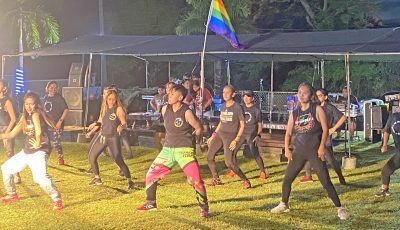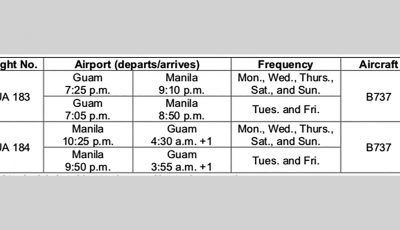US govt seeks court order to dissolve stay of Guanlao’s removal
The U.S. government is asking the federal court to dissolve its 2016 order staying an immigration judge’s ruling for the removal from the U.S. of Amalia Abo Guanlao, a Filipino mother of two minor U.S. children, including one who has a medical condition.
With the U.S. government’s motion to dissolve, U.S. District Court for the NMI designated Judge Frances Tydingco-Gatewood on Friday set an expedited hearing schedule.
Tydingco-Gatewood ordered Guanlao to file a response by July 9. The judge said any reply to Guanlao’s response must be filed by July 13.
Department of Justice Office of immigration litigation trial attorney Adrienne Zack, counsel for respondents U.S. Department of Homeland Security officials, said while their motion is not listed as a non-hearing motion per se, it is essentially requesting clarification of the court’s intent in dismissing the case.
Zack said if the court determines that a hearing is not necessary, the respondents do not request one.
Tydingco-Gatewood dismissed last June 19 Guanlao’s petition for a writ of habeas corpus, through which she seeks to appeal the immigration judge’s removal order.
On June 23, 2016, over respondents’ objection, U.S. District Court for the NMI Chief Judge Ramona V. Manglona issued a stay of Guanlao’s removal from the U.S.
Zack moved the court to formally lift the stay of removal because this case has been resolved.
According to court records, on Sept. 10, 2013, an immigration judge found that Guanlao was removable as an alien present without a valid immigrant visa or entry document and ordered her removed to the Philippines.
Guanlao appealed the judge’s decision pro se to the Board of Immigration Appeals.
On May 14, 2015, the BIA upheld the judge’s decision finding Guanlao was removable, stating that she raised no “factual or legal errors in the judge’s decision.”
On March 2, 2016, the BIA denied a motion to reopen because it was untimely and because Guanlao did not show that reopening would affect the outcome of the prior proceedings. On May 8, 2016, Enforcement and Removal Operations for Immigration and Customs Enforcement placed Guanlao under an order of supervision.
Guanlao complied with weekly reporting requirements of the order of supervision. However, on June 15, 2016, ERO ordered Guanlao to report to the airport on June 22, 2016, so that she could be removed.
On June 21, 2016, Guanlao filed a petition for a writ of habeas corpus, seeking determination of “the legality of her continued detention and intended removal” and “a stay of her removal during the pendency of this case.”
Zack said Guanlao failed to comply with the order and did not report to the airport.
Therefore, Zack said, she has an outstanding warrant for removal. Nevertheless, ICE has never held her in physical custody.
The District Court ordered Guanlao to show cause, and, after subsequent briefing, found that jurisdiction may exist to hear a portion of her claim.
On June 23, 2016, Manglona entered a stay of removal “while the court hears the petition on the merits,” which has not been otherwise lifted.
On Dec. 20, 2017, respondents moved to dismiss the second amended petition and also requested that the court granted respondents’ motion to dismiss.
Tydingco-Gatewood dismissed petitioner’s claims with prejudice. However, she did not explicitly address the stay of removal.
In light of the court’s dismissal of the claims, Zack said, respondents request an order explicitly dissolving the stay of removal entered in 2016.
Zack said when a court dismisses a case in full, the underlying stay of removal issued to allow an alien to remain in the U.S. should be vacated because the purpose of the stay is no longer served.
Zack said when the 9th Circuit dismisses a petition for review, it typically terminates the temporary or full stay of removal if one was in place.
Here, Zack said, the court issued the stay so that the court could hear Guanlao’s claims on the merits.
Having done so, Zack said, the court should now vacate the stay of removal.
Guanlao, who herself has medical condition, has been residing on Saipan for over 24 years now.
In her order that granted U.S. Homeland Security officials’ motion to dismiss, Tydingco-Gatewood said since Guanlao failed to exhaust administrative remedies of her claims, she would generally be required to return to the Board of Immigration Appeals to pursue them.
However, Tydingco-Gatewood said, the 30-day window for filing a motion to reopen the case has lapsed, and the District Court lacks jurisdiction to order the window reopened.
Thus, the judge said, Guanlao cannot prevail on her due process claim in the District Court, before the BIA, or before the U.S. Court of Appeals for the Ninth Circuit.
“While this outcome may seem harsh, especially given the alleged deficiencies of multiple attorneys involved in this case, the court is not empowered to do more than authorized by the constitution and by statute,” said Tydingco-Gatewood, adding that she cannot grant Guanlao the relief that she seeks.
She directed the clerk of court to close Guanlao’s case.
Aside from naming then-U.S. Department of Homeland Security Secretary Jeh Johnson as respondent, Guanlao also sued several U.S. immigration officials.
Rosemond Santos appeared as counsel for Guanlao. Before having Santos as her lawyer, for many months she had sought for a lawyer after her previous counsel was disbarred.
In her declaration filed in court, Guanlao disclosed that since 2013 she has been suffering with pain in her left breast and back.
She underwent operation in the Philippines in 2008, but since then had never any follow-up check-up.
Guanlao said her husband has been working in Saipan since 1989.
Guanlao said their two minor children were born on Saipan.
“They are the reason why I want to live longer and to be with them for the rest of my life,” she said.



























